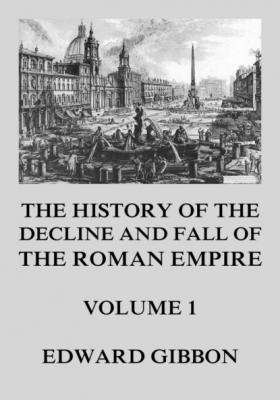ТОП просматриваемых книг сайта:
The History of the Decline and Fall of the Roman Empire. Эдвард Гиббон
Читать онлайн.Название The History of the Decline and Fall of the Roman Empire
Год выпуска 0
isbn 9783849658526
Автор произведения Эдвард Гиббон
Жанр Документальная литература
Серия The History of the Decline and Fall of the Roman Empire
Издательство Bookwire
The History Of The Decline And Fall Of The Roman Empire
Volume 1
EDWARD GIBBON
The History of the Decline and Fall of the Roman Empire Vol. 1, Edward Gibbon,
Jazzybee Verlag Jürgen Beck
86450 Altenmünster, Loschberg 9
Deutschland
ISBN: 9783849658526
www.jazzybee-verlag.de
admin@jazzybee-verlag.de
CONTENTS:
ADVERTISEMENT TO THE NOTES6 12
ADVERTISEMENT TO THE FIRST OCTAVO EDITION.. 13
PREFACE TO THE FOURTH VOLUME OF THE QUARTO EDITION.. 14
INTRODUCTIONRef. 002
By W. E. H. Lecky
The history of Gibbon has been described by John Stuart Mill as the only eighteenth-century history that has withstood nineteenth-century criticism; and whatever objections modern critics may bring against some of its parts, the substantial justice of this verdict will scarcely be contested. No other history of that century has been so often reprinted, annotated, and discussed, or remains to the present day a capital authority on the great period of which it treats. As a composition it stands unchallenged and conspicuous among the masterpieces of English literature, while as a history it covers a space of more than twelve hundred years, including some of the most momentous events in the annals of mankind.
Gibbon was born at Putney, Surrey, April 27, 1737. Though his father was a member of Parliament and the owner of a moderate competence, the author of this great work was essentially a self-educated man. Weak health and almost constant illness in early boyhood broke up his school life, — which appears to have been fitfully and most imperfectly conducted, — withdrew him from boyish games, but also gave him, as it has given to many other shy and sedentary boys, an early and inveterate passion for reading. His reading, however, was very unlike that of an ordinary boy. He has given a graphic picture of the ardour with which, when he was only fourteen, he flung himself into serious but unguided study; which was at first purely desultory, but gradually contracted into historic lines, and soon concentrated itself mainly on that Oriental history which he was one day so brilliantly to illuminate. “Before I was sixteen,” he says, “I had exhausted all that could be learned in English of the Arabs and Persians, the Tartars and Turks; and the same ardour led me to guess at the French of D’Herbelot, and to construe the barbarous Latin of Pocock’s ‘Abulfaragius.’”
His health, however, gradually improved, and when he entered Magdalen College, Oxford, it might have been expected that a new period of intellectual development would have begun; but Oxford had at this time sunk to the lowest depth of stagnation, and to Gibbon it proved extremely uncongenial. He complained that he found no guidance, no stimulus, and no discipline, and that the fourteen months he spent there were the most idle and unprofitable of his life. They were very unexpectedly cut short by his conversion to the Roman Catholic faith, which he formally adopted at the age of sixteen.
This conversion is, on the whole, the most surprising incident of his calm and uneventful life. The tendencies of the time, both in England and on the Continent, were in a wholly different direction. The more spiritual and emotional natures were now passing into the religious revival of Wesley and Whitefield, which was slowly transforming the character of the Anglican Church and laying the foundations of the great Evangelical party. In other quarters the predominant tendencies were towards unbelief, scepticism, or indifference. Nature seldom formed a more sceptical intellect than that of Gibbon, and he was utterly without the spiritual insight, or spiritual cravings, or overmastering enthusiasms, that produce and explain most religious changes. Nor was he in the least drawn towards Catholicism on its æsthetic side. He had never come in contact with its worship or its professors; and to his unimaginative, unimpassioned, and profoundly intellectual temperament, no ideal type could be more uncongenial than that of the saint. He had, however, from early youth been keenly interested in theological controversies. He argued, like Lardner and Paley, that miracles are the Divine attestation of orthodoxy. Middleton convinced him that unless the Patristic writers were wholly undeserving of credit, the gift of miracles continued in the Church during the fourth and fifth centuries; and he was unable to resist the conclusion that during that period many of the leading doctrines of Catholicism had passed into the Church. The writings of the Jesuit Parsons, and still more the writings of Bossuet, completed the work which Middleton had begun. Having arrived at this conclusion, Gibbon acted on it with characteristic honesty, and was received into the Church on the 8th of June, 1753.
The English universities were at this time purely Anglican bodies, and the conversion of Gibbon excluded him from Oxford. His father judiciously sent him to Lausanne to study with a Swiss pastor named Pavilliard, with whom he spent five happy and profitable years. The theological episode was soon terminated. Partly under the influence of his teacher, but much more through his own reading and reflections, he soon disentangled the purely intellectual ties that bound him to the Church of Rome; and on Christmas Day, 1754, he received the sacrament in the Protestant church of Lausanne.
His residence at Lausanne was very useful to him. He had access to books in abundance, and his tutor, who was a man of great good sense and amiability but of no remarkable capacity, very judiciously left his industrious pupil to pursue his studies in his own way. “Hiving wisdom with each studious year,” as Byron so truly says, he speedily amassed a store of learning which has seldom been equalled.

